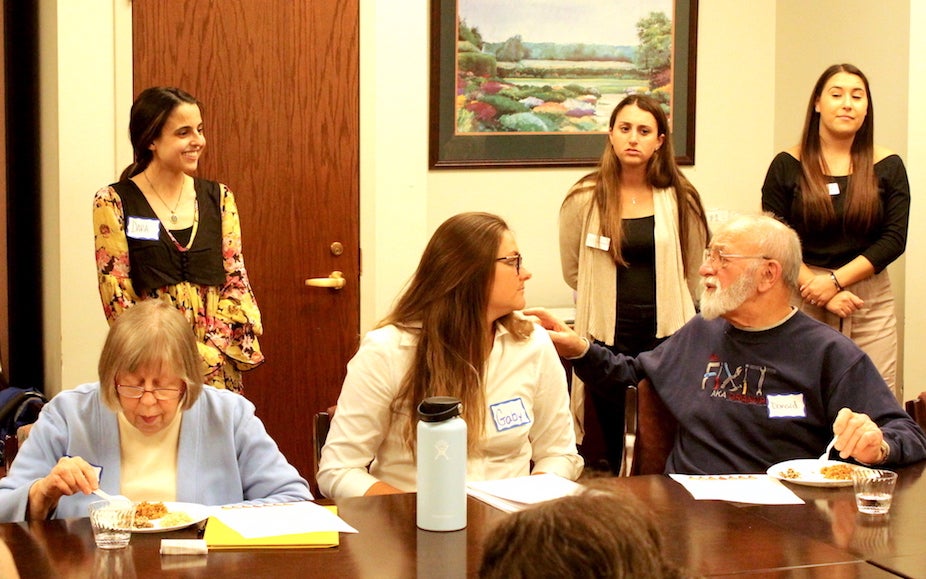College of Health Sciences program helps treat speech impediments, swallowing difficulties
Among the physical impediments faced by patients diagnosed with Parkinson’s Disease, speech and swallowing complications are often the first and most common. The problem is so severe, the Centers for Disease Control and Prevention lists swallowing complications among Parkinson’s patients as the 14th leading cause of death in the U.S.
An interdisciplinary project within the College of Health Sciences aims to assist Parkinson’s patients with both impediments, helping them speak more clearly and loudly, while at the same time treating their dysphagia — a swallowing disorder — helping prevent the malnutrition experienced by as many as 50 percent of people with Parkinson’s Disease.
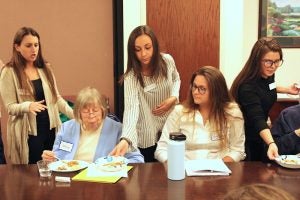 “LOUD for Life” is a weekly speech exercise group for people with Parkinson’s, which meets throughout the academic year and into the summer session. Participants are recruited from the community and meet weekly in Independence Square with students and faculty members who lead them through various speech exercises and games, and treat them to a healthy meal prepared specifically to meet their special needs. The program provides an educational experience for the students while helping fill a critical need, according to Leslie Mahler, associate professor in the department of Communicative Disorders, who has been running the program at URI for 11 years.
“LOUD for Life” is a weekly speech exercise group for people with Parkinson’s, which meets throughout the academic year and into the summer session. Participants are recruited from the community and meet weekly in Independence Square with students and faculty members who lead them through various speech exercises and games, and treat them to a healthy meal prepared specifically to meet their special needs. The program provides an educational experience for the students while helping fill a critical need, according to Leslie Mahler, associate professor in the department of Communicative Disorders, who has been running the program at URI for 11 years.
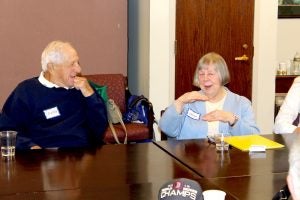 “A Parkinson’s diagnosis requires a whole community for support. We feel we’re filling a gap for them,” Mahler said. “They are living their lives not defined by Parkinson’s. The people in this group know what a big deal that is.”
“A Parkinson’s diagnosis requires a whole community for support. We feel we’re filling a gap for them,” Mahler said. “They are living their lives not defined by Parkinson’s. The people in this group know what a big deal that is.”
The abilities to communicate and eat are fundamental to human existence, and they go hand-in-hand for Parkinson’s patients. The motor skills they tend to lose cause people with Parkinson’s to speak at a lower volume and with imprecise articulation, making it difficult for others to understand them. Those same motor skills also control the ability to swallow, making something as fundamental as eating a dangerous activity.
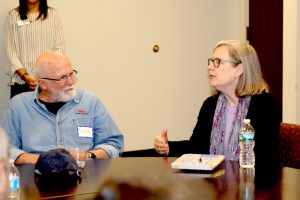 At a recent “LOUD for Life” meeting, Communicative Disorder students led the participants through multiple voice exercises, beginning with simply saying “ahhhh” together at different volumes and pitches. The participants then took turns practicing common daily thoughts and phrases, such as “What do you want to do today?” and “I love you,” before pairing off for some one-on-one conversation. Students from Nutrition and Food Science then served healthy whole grain meals designed specifically for those with swallowing difficulties.
At a recent “LOUD for Life” meeting, Communicative Disorder students led the participants through multiple voice exercises, beginning with simply saying “ahhhh” together at different volumes and pitches. The participants then took turns practicing common daily thoughts and phrases, such as “What do you want to do today?” and “I love you,” before pairing off for some one-on-one conversation. Students from Nutrition and Food Science then served healthy whole grain meals designed specifically for those with swallowing difficulties.
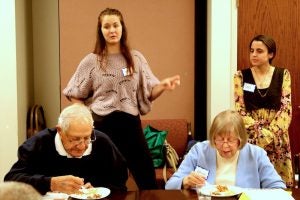 The goal is for participants to learn to speak more loudly and clearly so they can be understood, which is among the most frustrating problems those with Parkinson’s face, according to Shelton Golden, 90, one of the group’s participants. The group also provides a social component, allowing participants to communicate with and learn from each other.
The goal is for participants to learn to speak more loudly and clearly so they can be understood, which is among the most frustrating problems those with Parkinson’s face, according to Shelton Golden, 90, one of the group’s participants. The group also provides a social component, allowing participants to communicate with and learn from each other.
“Am I speaking loudly enough? Can people understand me? Sometimes you don’t know if they can hear you,” Golden said, adding the group helps him cope with his condition. “I used to be very athletically inclined. Sometimes, I think ‘Why did He pick me? Why did He do this to me?’ But I get up in the morning and I get going. This makes things a little easier. I love the meetings a lot.”
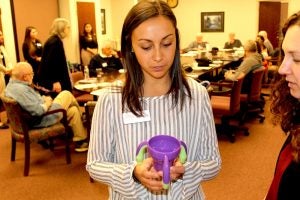 The program aims to make things a little easier for all people with Parkinson’s, and organizers hope to reach people beyond the 15 who regularly take part in Loud for Life.
The program aims to make things a little easier for all people with Parkinson’s, and organizers hope to reach people beyond the 15 who regularly take part in Loud for Life.
Two Health Sciences students — Madeline Delisio and Rachel Moody — plan to detail the lessons taught in the program in a book they are compiling, thanks to a $2,278 grant from the state Executive Office of Health and Human Services. The book will contain instructions for the speech exercises they’ve been performing, as well as information on proper swallowing and recipes for the meals they’ve eaten throughout the program. The funds also help the group provide tools like weighted utensils to help combat tremors while eating, shaker cups and metal straws to assist in swallowing.
“It is extremely important to the health and well-being of those affected by PD to learn proper management of speech, swallowing and nutrition to maximize quality of life,” Delisio wrote in her grant application. “An interdisciplinary approach is best. Participants can expect to see 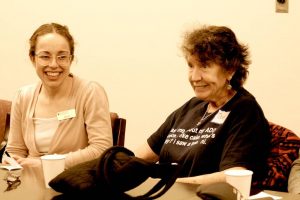 improvement in their speech and swallowing abilities as a result of completing the exercises in the group and complying with recommendations for home practice.”
improvement in their speech and swallowing abilities as a result of completing the exercises in the group and complying with recommendations for home practice.”
LOUD for Life meets weekly on Tuesdays. For more information, contact Leslie Mahler at lmahler@uri.edu.

